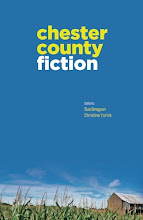Frank Roger and I both have stories in the just-released Fall Into Fantasy 2017 anthology,
published by Cloaked Press. Earlier I interviewed another contributor, Molly Neely.
Frank has written several hundred short stories. He is also the author of
the science fiction novel Bonobo Sapiens. He currently lives in Ghent, Belgium.
1) Frank, I don’t know if you were a
fan, but I’d like to express my condolences on the passing of Johnny Hallyday.
I understand he was the biggest rock-and-roll star in France and Belgium for
over fifty years.
Honestly, I wasn’t a fan. Hallyday was mostly
popular in the French-speaking part of the country. But music (both live and
recorded) has been a lifelong passion: I grew up with the heavy and progressive
bands of the 70s and beyond (Deep Purple, Black Sabbath, Nazareth, Yes, King
Crimson, UFO, Magnum, Wishbone Ash, Styx, 38 Special, Samson and too many
others to mention), as well as some different stuff (such as singer-songwriter
Heather Nova).
2) Like most Belgians, I assume
you’re multilingual. Do you write in different languages, or just in English?
My native language is Dutch. When I began writing, I
naturally did so in Dutch. Later on I switched to English, as this offered more
market possibilities. I still write in Dutch too, and when I find the time, I
translate (or retell) some of my stories into French (my second language). On
top of that, many of my stories have been published in translation in a growing
number of languages (over 40 by now, ranging from the very small (Manx) to the
very big (Chinese)).
3) That's amazing! I don't think my work has been in more than 10 languages so far.
In an email, you mentioned that you went to
the latest World Science Fiction Convention, which was held in Helsinki. In
fact, you’re the only person I know
who attended that convention. I assume you’ve been to other WorldCons. How did
the Helsinki Con compare with other Cons you’ve attended?
I visited worldcons (and other conventions) in many
countries in Europe, as well as in the USA, Canada and India. The Helsinki
worldcon stood out because it was a very international worldcon, even more so
than the one in London in 2014. The American and Canadian conventions I attended
were noticeably less international in scope. The convention in India (where I
was one of the Guests of Honor by the way) was an academic affair, supposed to
be international, but attracting mostly people from all over India.
4) Your story in Fall Into Fantasy, “Variant Readings,”
is about 3,000 to 3,500 words long, correct? How do you decide what is the best
length for a story?
Each story has its own natural length. That may be
50, 500, 5,000 or 50,000 words. I never trim or expand stories to fit a certain
length. They always happen to be exactly as long as they need to be. My stories
are not plot-driven or character-driven, but idea-driven: some ideas take more
space to develop than others.
5) You’ve written flash fiction,
short stories, and novels. Which do you prefer?
I don’t think of myself as a novelist. I prefer
doing short stories of varying lengths. I tend to think that novel writing and
story writing are two very different talents, and few writers are blessed with
both. My favorite short story writers are Philip K. Dick, J.G. Ballard and
Jorge Luis Borges. Writers like Dick and Ballard (and perhaps I should also
mention Robert Silverberg here) also did novels of course, but I always thought
they excel at shorter work. My story “Variant Readings” was of course inspired
by Borges. It is one of many stories of mine about strange books or bookstores.
6) Before they submit their work,
many writers run it by either a trusted critique group or a cadre of beta
readers. Do you, and how did you get
that group? (It took me many years to
find a critique group that I found truly helpful.)
When a story is finished, I prefer submitting it
right away. I trust an editor’s decision more than the view of someone who may
or may not like a story for a variety of reasons, but whose opinion won’t lead
to a publication. Some stories get picked up quickly, others take years to find
a home. I have written about five hundred stories by now, and I believe that
eventually they will all see print somewhere.
7) Let’s finish up with a process
question: how do you write? Do you do it in the same time and place every
day?
I take lots of notes. That’s how each story starts
out. I only begin writing when I have a title, a beginning and an end.
Improvisation doesn’t work for me. I try to do some writing every day, and I
prefer working in the evening. Perhaps good stories never come to fruition in
broad daylight?
On that we're in agreement: good stories are created at night!
Frank, thanks
for sitting for this interview. Maybe we’ll get to meet at a future World
Science Fiction Convention.



